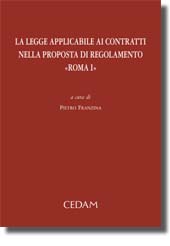Conference: «The New European Contract Law: From the Rome Convention to the “Rome I” Regulation»
An international symposium on Rome I Proposal is organised on March 23th and 24th in Bari by the Fondazione Italiana per il Notariato (Italian Notary Public Foundation) and the University of Bari (Department of International Law and EU Law):
More than fifteen years after the Rome Convention on the law applicable to contractual obligations took effect, there are several reasons to open a new public debate on the private international law provisions for one of the most crucial areas in the notarial practice.
First of all, the development of specific contract–related rules, both at Community and international level, frequently clashes with the discipline set by the Convention. Moreover, delicate problems arise both from the possibility to choose, as the applicable law, not only national statutes, but also non binding codes (for example the UNIDROIT principles) and from the progressive development of a core of mandatory Community rules applicable to intra-Community cases.
The application of the Convention meets further challenges in the rise of new issues (such as e-contracting and its influence on the rules concerning contract completion; consumers’ contracts); and in the development of new legal issues, such as the agreements that govern non-matrimonial relationships.
This led the European Commission to submit a draft regulation (so-called Rome I), which not only introduces our subject into the communitarisation process of Private International Law, but which also modifies its content on important aspects. This conference represents, therefore, a special opportunity for a de iure condito discussion of the results achieved, and of problems still to be solved, and for an evaluation of possible solutions to be adopted de iure condendo.
Here's the programme:
FRIDAY 23 MARCH – MORNING SESSION
Chair: Bruno Volpe (Consiglio Nazionale del Notariato)
- Welcome speech – Giovanni Cellamare (University of Bari)
- Introductory address – Giuseppe Gargani (Chairman of the European Parliament Legal Affairs Committee)
- The Communitarization of Private International Law: Role and Prospects of Private Autonomy – Sergio Maria Carbone (University of Genoa)
- Delimiting the Scope of Application of Community Conflict Rules on Contractual Obligations: in particular, Gifts and Conventions Governing Non-matrimonial Relationships – Giovanni Liotta (Consiglio Nazionale del Notariato)
- Delimiting the Scope of Application of Community Conflict Rules on Contractual Obligations: in particular, Shareholders’ Agreements – Stefania Bariatti (University of Milan)
- The Law Applicable in the Absence of Choice: Difference between the Old and New Discipline – Ugo Villani ("Luiss-Guido Carli" University of Rome)
- Freedom of Choice of the Applicable Law – Gabriella Carella (scientific coordinator of the conference, University of Bari)
FRIDAY 23 MARCH – AFTERNOON SESSION
Chair: Fausto Pocar (University of Milan – President of the ICTY)
- Choosing as Applicable Law «the Principles and Rules of the Substantive Law of Contract Recognised Internationally or in the Community »: Examples and Impact on Contracts’ Practice – Olivier Tell (European Commission, DG for Freedom, Security and Justice)
- Drafting the Choice-of-law Clauses – Alfredo Maria Becchetti (Consiglio Nazionale del Notariato)
- Internally, Communitary and Internationally Mandatory Rules – Nerina Boschiero (University of Milan)
- Consumer Contracts Concluded by Remote Communication Techniques – Cyril Nourissat ("Jean Moulin" University – Lyon 3)
- The Law Applicable to Agency – David Ockl (Consiglio Nazionale del Notariato)
- Matters Governed by Lex Contractus and the Law Applicable to the Effects of Contract as Against Third Parties – Domenico Damascelli (scientific coordinator of the conference, Consiglio Nazionale del Notariato)
SATURDAY 24 MARCH – MORNING SESSION
Chair: Federico Tassinari (Consiglio Nazionale del Notariato)
- The Law Applicable to the Form of Contracts; in particular, Contracts Relating to a Right in Rem or Right of User in Immovable Property – Tito Ballarino (University of Padua) and Paolo Pasqualis (Consiglio Nazionale del Notariato)
- The Law Applicable to Voluntary Assignment: Delimiting the Competence among Laws to Take into Account – Andrea Bonomi (University of Lausanne)
- The Impact of the “Rome I” Regulation on Italian Private International Law – Francesco Salerno (University of Ferrara)
- Draft Regulations Relationship with other Provisions of Community Law and with International Conventions – Andrea Cannone (University of Bari)
- Coordinating the “Rome I” and “Rome II” Draft Regulations – Luciano Garofalo (University of Taranto)
Simultaneous interpreting in English and French will be provided.
For further information and registration, see the website of the Fondazione Italiana per il Notariato and the downloadable leaflet (in English and French version).
 An Italian book has been recently published which collects a number of papers dealing with old and new questions raised by the modernisation of the 1980 Rome Convention and its conversion into a Community regulation (Rome I: see our dedicated page
An Italian book has been recently published which collects a number of papers dealing with old and new questions raised by the modernisation of the 1980 Rome Convention and its conversion into a Community regulation (Rome I: see our dedicated page  As we
As we  Initial reports this morning suggested that the European Parliament Legal Affairs Committee (
Initial reports this morning suggested that the European Parliament Legal Affairs Committee (